Marcia Thornton Jones's Blog, page 89
December 20, 2019
Failure, Fatal Flaws, and the Road to Success
Most authors, on the way to their first book, travel a road paved with plenty of rejection and failure; and even after publication, many of us continue to face failure as we figure out which way our path as a published writer takes us.
Not only is it often difficult to persevere in the midst of the failure we face, but it is also sometimes hard to remember that failure can at times be necessary for future success.
About ten years ago, I began a new manuscript and worked diligently on it for a couple years. I wrote it, revised it, got feedback from my critique group about it, polished it up, and finally sent it out into the world. I sent it to editors. I sent it to agents. And I received rejection letters from everyone. But finally, one agent responded with interest. She requested the entire manuscript, and after sending it to her, I waited with fingers and toes crossed. After several weeks, she got back to me with news I did not want to hear. Not only was her answer an ultimate "no," but the feedback she gave me about the main conflict in the plot ultimately felt like my beloved story contained an unfixable problem. I came away from the phone call believing my manuscript was fatally flawed. The story I had worked so hard on (and loved so much), in my mind, was beyond repair. So after a good cry, I did what all authors do, brushed myself off, rolled up my sleeves again, and got to work on something new.
Years later, after I had completed a few more manuscripts and managed to, not only begin working with an agent, but also to be fortunate enough to finally become a published author, I mentioned the old, fatally-flawed manuscript to my agent. Without even having read the manuscript, she very optimistically said there was likely a way to redeem the story. That was all the hope I needed to drag out that old manuscript again.
As I began working on the story, I struggled quite a bit to get past the "fatal flaws," but I kept at it and eventually found a way to breathe new life into the old characters and create a plot that worked. That manuscript is now the book When I Hit the Road, coming May 2020.
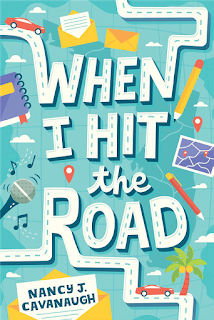
So, my not-so-fatally-flawed manuscript, that had felt like such a huge failure many years ago, is my most recent success. Seeing how the story has transformed from its original version to the book it is now honestly makes me thankful for its past failure and even makes me realize that its failure was actually a building block to its success.
Happy Reading,
Nancy J. Cavanaugh
Not only is it often difficult to persevere in the midst of the failure we face, but it is also sometimes hard to remember that failure can at times be necessary for future success.
About ten years ago, I began a new manuscript and worked diligently on it for a couple years. I wrote it, revised it, got feedback from my critique group about it, polished it up, and finally sent it out into the world. I sent it to editors. I sent it to agents. And I received rejection letters from everyone. But finally, one agent responded with interest. She requested the entire manuscript, and after sending it to her, I waited with fingers and toes crossed. After several weeks, she got back to me with news I did not want to hear. Not only was her answer an ultimate "no," but the feedback she gave me about the main conflict in the plot ultimately felt like my beloved story contained an unfixable problem. I came away from the phone call believing my manuscript was fatally flawed. The story I had worked so hard on (and loved so much), in my mind, was beyond repair. So after a good cry, I did what all authors do, brushed myself off, rolled up my sleeves again, and got to work on something new.
Years later, after I had completed a few more manuscripts and managed to, not only begin working with an agent, but also to be fortunate enough to finally become a published author, I mentioned the old, fatally-flawed manuscript to my agent. Without even having read the manuscript, she very optimistically said there was likely a way to redeem the story. That was all the hope I needed to drag out that old manuscript again.
As I began working on the story, I struggled quite a bit to get past the "fatal flaws," but I kept at it and eventually found a way to breathe new life into the old characters and create a plot that worked. That manuscript is now the book When I Hit the Road, coming May 2020.

So, my not-so-fatally-flawed manuscript, that had felt like such a huge failure many years ago, is my most recent success. Seeing how the story has transformed from its original version to the book it is now honestly makes me thankful for its past failure and even makes me realize that its failure was actually a building block to its success.
Happy Reading,
Nancy J. Cavanaugh
Published on December 20, 2019 04:30
December 19, 2019
A Memory of A Christmas Memory
Throughout my life, books have profoundly been a part of my journey, my experiences and who I’ve become.
One particularly special one, is Truman Capote’s A Christmas Memory. First, it was so meaningful to me as a child. Now, as an adult, it continues to be in my life - its message evolving and fitting into the narrow and painful spots or moments of happiness I continue to encounter as I age.
Each Christmas season, my mom and dad would watch or read A Christmas Memory with me. The narrative is sparkling, simple, beautiful and never fails to strike a cord no matter how many times I read it or hear it.
In the TV show, Capote narrates his short story to the actors. It brings that unique realism to the experience, and allows the reader to see, hear and feel the story with such intimate depth.
My family did not have much as I was growing up. Hearing Capote’s simple traditions at the holidays, where he most treasured not the trappings and gifts but the friendship of his buddy, was always comforting to me. It continues to be.
A Christmas Memory is still a holiday touchstone for me. It’s lines resound throughout my days all year long, though. Especially this year, 2019.
This year, my dad moved from the old farmhouse and acres and acres of field and trees where I was raised. It broke his heart to leave the rural land - where he lived alone for so long now, but was never lonely with the echoes of our childhood there, his memories of cutting wood and keeping the fire going, cooking on the wood stove in the kitchen, and the many cats and dogs - beloved such as Capote’s pup was - that passed through our doors, hearts and lives there. But it was time to downsize, to make things more simple, to prioritize health and finances. For both of us. Dad moved to town.
I pulled out my copy of A Christmas Memory in those days of moving him and on some other level - moving our lives...forward. On. Away.
It is in these simple memories Capote writes about that I find the most ease at these busy holidays that overwhelm my mind and senses. And in 2019, the overwhelming sense of grief and loss of home and loved ones. Those simple memories like Capote’s: Trips to the trees to pick ripe nuts or fruit, a walk through a pine grove with the dog - searching for the best tree, baking in the kitchen, dancing with your friend.
It wrenched my heart to see the land go, too. I’ve felt untethered ever since, a kite without a string or a weight to rein it in. Like Capote’s memory, mine are not grand or fancy. They are running through golden autumn fields with my dog at my side, cuddling with a cat on the porch watching the rain, the heavy snow in the trees during a long winter walk, the monarchs each summer, the ponds filling each spring, the migrating birds and all the wildlife that changed with the seasons. It’s all just memories now.
Dad reached out to me in recent weeks, reminding me that one day we’ll be there again. On that land, in those fields, “…two kites hurrying towards heaven,” as Capote said.
“I've always thought a body would have to be sick and dying before they saw the Lord. And I imagined that when He came it would be like looking at the Baptist window: pretty as coloured glass with the sun pouring through, such a shine you don't know it's getting dark. And it's been a spooky feeling. But I'll wager it never happens. I'll wager at the very end a body realizes the Lord has already shown Himself. That things as they are' - her hand circles in a gesture that gathers clouds and kites and grass and Queenie pawing earth over her bone - 'just what they've always seen, was seeing Him. As for me, I could leave the world with today in my eyes.” -Truman Capote

One particularly special one, is Truman Capote’s A Christmas Memory. First, it was so meaningful to me as a child. Now, as an adult, it continues to be in my life - its message evolving and fitting into the narrow and painful spots or moments of happiness I continue to encounter as I age.
Each Christmas season, my mom and dad would watch or read A Christmas Memory with me. The narrative is sparkling, simple, beautiful and never fails to strike a cord no matter how many times I read it or hear it.
In the TV show, Capote narrates his short story to the actors. It brings that unique realism to the experience, and allows the reader to see, hear and feel the story with such intimate depth.
My family did not have much as I was growing up. Hearing Capote’s simple traditions at the holidays, where he most treasured not the trappings and gifts but the friendship of his buddy, was always comforting to me. It continues to be.
A Christmas Memory is still a holiday touchstone for me. It’s lines resound throughout my days all year long, though. Especially this year, 2019.
This year, my dad moved from the old farmhouse and acres and acres of field and trees where I was raised. It broke his heart to leave the rural land - where he lived alone for so long now, but was never lonely with the echoes of our childhood there, his memories of cutting wood and keeping the fire going, cooking on the wood stove in the kitchen, and the many cats and dogs - beloved such as Capote’s pup was - that passed through our doors, hearts and lives there. But it was time to downsize, to make things more simple, to prioritize health and finances. For both of us. Dad moved to town.
I pulled out my copy of A Christmas Memory in those days of moving him and on some other level - moving our lives...forward. On. Away.
It is in these simple memories Capote writes about that I find the most ease at these busy holidays that overwhelm my mind and senses. And in 2019, the overwhelming sense of grief and loss of home and loved ones. Those simple memories like Capote’s: Trips to the trees to pick ripe nuts or fruit, a walk through a pine grove with the dog - searching for the best tree, baking in the kitchen, dancing with your friend.
It wrenched my heart to see the land go, too. I’ve felt untethered ever since, a kite without a string or a weight to rein it in. Like Capote’s memory, mine are not grand or fancy. They are running through golden autumn fields with my dog at my side, cuddling with a cat on the porch watching the rain, the heavy snow in the trees during a long winter walk, the monarchs each summer, the ponds filling each spring, the migrating birds and all the wildlife that changed with the seasons. It’s all just memories now.
Dad reached out to me in recent weeks, reminding me that one day we’ll be there again. On that land, in those fields, “…two kites hurrying towards heaven,” as Capote said.
“I've always thought a body would have to be sick and dying before they saw the Lord. And I imagined that when He came it would be like looking at the Baptist window: pretty as coloured glass with the sun pouring through, such a shine you don't know it's getting dark. And it's been a spooky feeling. But I'll wager it never happens. I'll wager at the very end a body realizes the Lord has already shown Himself. That things as they are' - her hand circles in a gesture that gathers clouds and kites and grass and Queenie pawing earth over her bone - 'just what they've always seen, was seeing Him. As for me, I could leave the world with today in my eyes.” -Truman Capote

Published on December 19, 2019 07:04
December 17, 2019
Failures Give Us Something to Write About by Claudia Mills
I wrote my first book when I was six years old.
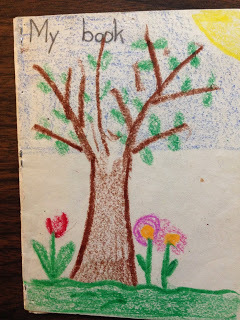 Although there were barely more than a dozen words in the entire text of the book itself, at the end I included several pages of advertisements for promised future publications.
Although there were barely more than a dozen words in the entire text of the book itself, at the end I included several pages of advertisements for promised future publications.
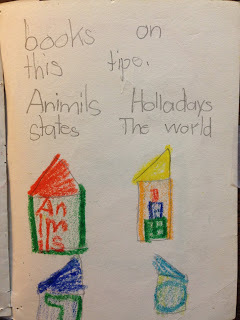
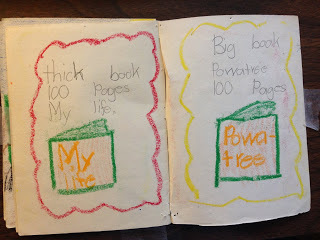 I wrote the "thick book" of "100 pages" about "My life" when I was in 8th grade. Typed on a manual typewriter, with a second copy made via carbon paper, it was titled T Is For Tarzan, as my nickname in 8th grade was Tarzan (don't ask!).
I wrote the "thick book" of "100 pages" about "My life" when I was in 8th grade. Typed on a manual typewriter, with a second copy made via carbon paper, it was titled T Is For Tarzan, as my nickname in 8th grade was Tarzan (don't ask!).
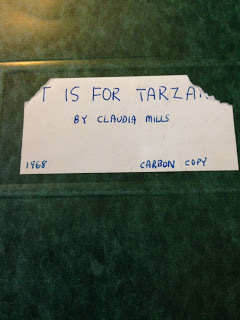 The book chronicled various events in my life during that momentous year, but it was really a detailed record of my failures. I ran for class president against three boys, and not only did I lose, but when the votes were counted, it was a three-way tie, with the three boys as co-winners and me as the only loser. I challenged the fastest boy in the class to a race around the track at lunchtime, and not only did I lose, but he ran backward for the last stretch. When we had a girls-ask-boys dance, every single boy I asked turned me down. All horrible!
The book chronicled various events in my life during that momentous year, but it was really a detailed record of my failures. I ran for class president against three boys, and not only did I lose, but when the votes were counted, it was a three-way tie, with the three boys as co-winners and me as the only loser. I challenged the fastest boy in the class to a race around the track at lunchtime, and not only did I lose, but he ran backward for the last stretch. When we had a girls-ask-boys dance, every single boy I asked turned me down. All horrible!
But the stories I wrote about these failures, with utter candor, and my best attempts at humor, made my book the sensation of the junior high school, with an actual waiting list where kids signed up to get their turn. Even decades later, a boy from high school sent me an email with the subject heading, "T Is For Too Long Since We've Talked." And - my life's biggest bragging point - one of the episodes from the book became a question on a high school reunion trivia quiz: "Who was the boy who beat Tarzan in the famous race-around-the track?"
Failures make the best stories. When I visit schools, I ask the kids, "Which makes a better story, good things or bad things?" The younger they are, the more likely they are to answer "Good things!" But the older they are, and the greater their experience as readers, the more likely they are to answer "Bad things!"
So I'm grateful for that 8th grade year of failure that gave me my first success as a writer. Yay for failure!
 Although there were barely more than a dozen words in the entire text of the book itself, at the end I included several pages of advertisements for promised future publications.
Although there were barely more than a dozen words in the entire text of the book itself, at the end I included several pages of advertisements for promised future publications.
 I wrote the "thick book" of "100 pages" about "My life" when I was in 8th grade. Typed on a manual typewriter, with a second copy made via carbon paper, it was titled T Is For Tarzan, as my nickname in 8th grade was Tarzan (don't ask!).
I wrote the "thick book" of "100 pages" about "My life" when I was in 8th grade. Typed on a manual typewriter, with a second copy made via carbon paper, it was titled T Is For Tarzan, as my nickname in 8th grade was Tarzan (don't ask!). The book chronicled various events in my life during that momentous year, but it was really a detailed record of my failures. I ran for class president against three boys, and not only did I lose, but when the votes were counted, it was a three-way tie, with the three boys as co-winners and me as the only loser. I challenged the fastest boy in the class to a race around the track at lunchtime, and not only did I lose, but he ran backward for the last stretch. When we had a girls-ask-boys dance, every single boy I asked turned me down. All horrible!
The book chronicled various events in my life during that momentous year, but it was really a detailed record of my failures. I ran for class president against three boys, and not only did I lose, but when the votes were counted, it was a three-way tie, with the three boys as co-winners and me as the only loser. I challenged the fastest boy in the class to a race around the track at lunchtime, and not only did I lose, but he ran backward for the last stretch. When we had a girls-ask-boys dance, every single boy I asked turned me down. All horrible!But the stories I wrote about these failures, with utter candor, and my best attempts at humor, made my book the sensation of the junior high school, with an actual waiting list where kids signed up to get their turn. Even decades later, a boy from high school sent me an email with the subject heading, "T Is For Too Long Since We've Talked." And - my life's biggest bragging point - one of the episodes from the book became a question on a high school reunion trivia quiz: "Who was the boy who beat Tarzan in the famous race-around-the track?"
Failures make the best stories. When I visit schools, I ask the kids, "Which makes a better story, good things or bad things?" The younger they are, the more likely they are to answer "Good things!" But the older they are, and the greater their experience as readers, the more likely they are to answer "Bad things!"
So I'm grateful for that 8th grade year of failure that gave me my first success as a writer. Yay for failure!
Published on December 17, 2019 23:00
December 16, 2019
Failures? Let me count the ways, by Michele Weber Hurwitz
It's a lesson writers hear often -- failure is part of the journey to not failing, or hopefully to success, to getting published. I've certainly traveled that road.

I wrote three middle grade novels before my first published one. I thought they were brilliant; agents and publishers did not agree. I tried my hand at writing contemporary women's fiction. Not a good fit. I even wrote a middle grade novel after publishing two with Random House that received numerous rejections and didn't end up with a contract.
When I visit schools, I ask kids which sports or activities they do -- basketball, violin, painting -- and then ask if they made a three-point shot or played a concerto or produced a finished piece of art on their first, or even second or third try, and of course the answer is no.
Writing is no different. Despite the couple of first-time successes we all loathe to hear about, most of us take years to nurture our craft before it becomes any good. And then publishing can take years more! One of my favorite stories about writing and publishing is that The Help received 60 rejections before it was published and became a best-seller.
Hopefully, we all come to realize one day that our failures were part of the journey to get us where we are. In fact, studies have found that failing really does make us tougher, help us overcome fear, inspires creative solutions, builds character, and in many cases, urges us to try harder the next time.
So as we begin a new year and new decade, here's to failure as well as success. May you thrive from both.
Michele Weber Hurwitz's newest middle grade novel, Hello from Renn Lake, about climate change and youth activism, publishes next May from Penguin Random House/Wendy Lamb Books. micheleweberhurwitz.com

I wrote three middle grade novels before my first published one. I thought they were brilliant; agents and publishers did not agree. I tried my hand at writing contemporary women's fiction. Not a good fit. I even wrote a middle grade novel after publishing two with Random House that received numerous rejections and didn't end up with a contract.
When I visit schools, I ask kids which sports or activities they do -- basketball, violin, painting -- and then ask if they made a three-point shot or played a concerto or produced a finished piece of art on their first, or even second or third try, and of course the answer is no.
Writing is no different. Despite the couple of first-time successes we all loathe to hear about, most of us take years to nurture our craft before it becomes any good. And then publishing can take years more! One of my favorite stories about writing and publishing is that The Help received 60 rejections before it was published and became a best-seller.
Hopefully, we all come to realize one day that our failures were part of the journey to get us where we are. In fact, studies have found that failing really does make us tougher, help us overcome fear, inspires creative solutions, builds character, and in many cases, urges us to try harder the next time.
So as we begin a new year and new decade, here's to failure as well as success. May you thrive from both.
Michele Weber Hurwitz's newest middle grade novel, Hello from Renn Lake, about climate change and youth activism, publishes next May from Penguin Random House/Wendy Lamb Books. micheleweberhurwitz.com
Published on December 16, 2019 06:00
December 15, 2019
Happy Holiday Journeys!
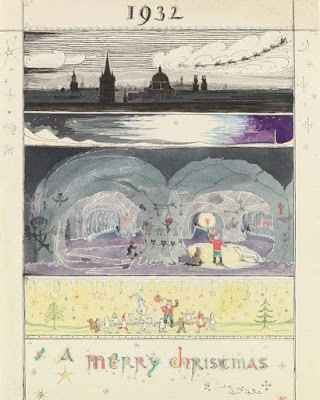
In December 1920 Father Christmas wrote a letter to the Tolkien home. Enclosed was a watercolor sketch. The letter began, “I heard you ask Daddy what I was like and where I lived,” he wrote to three-year-old John Tolkien, and as the family grew to four children, Father Christmas continued to write every Christmas for 23 years, until the youngest, Priscilla, was 14.
Many of his letters recount the adventures of his friend and helper the Polar Bear – in 1926 he accidentally switched on all the Northern Lights – or the goblins who attempted to steal the stored presents in 1932. In one letter Polar Bear “found a hole in the side of a hill & went inside because it was snowing”. He slid down a rocky slope, more rock fell on him, and he could not climb back: “But almost at once he smelled goblin & became interested & started to explore. Not very wise for of course goblins can’t hurt HIM but their caves are very dangerous.” The snow, the entrance to treacherous caves and the smell of goblin will be instantly familiar to readers of the book Tolkien was working on at the time, The Hobbit, the first of the adventures of Middle-earth.
A very happy Christmas! I suppose you will be hanging up your stocking just once more: I hope so for I have still a few little things for you. After this I shall have to say "goodbye", more or less: I mean, I shall not forget you. We always keep the old numbers of our old friends, and their letters; and later on we hope to come back when they are grown up and have houses of their own and children. -- J.R.R. Tolkien
May your holiday happenings be filled with more inspirations, and less failings (unless it's pie. Even a pie less than perfect is still delicious)!
--Bobbi Miller
About the picture: The 1932 Christmas Letter (J.R.R. Tolkien) told how goblins had attempted to steal presents stored ready for Christmas. Photograph: The Tolkien Estate Ltd 1976
Published on December 15, 2019 04:12
December 12, 2019
Failures That Benefit a Writer
I thought I would take a different approach to this month's theme of "favorite failures" by highlighting three corporate failures that ended up benefiting those of us in the writing community. I'm sure I'm not the only one who has come to rely on these products to get us through revisions, and our personal writing failures.
1. INK JET PRINTER: When a Canon engineer rested his hot iron on a pen by mistake, ink ejected from the pen's point moments later. This principle led to the ink jet printer we all know and love/hate.
2. While trying to create a strong adhesive, Spencer Silver - a researcher at 3M Labs - ended up with a formula weaker than what was already available. It stuck to objects but could be easily pulled away. It wasn't until years later that a colleague spread the substance on pieces of paper to mark his place in a hymn book that the idea for this popular product was born.

3. Finally, when failure has gotten the best of us, and we just need something to make us feel better, here is one of the world's tastiest failures. Created by Ruth Wakefield, a baker at the Toll House Inn, CHOCOLATE CHIP COOKIES were created when Ruth ran out of baking chocolate while making a batch of cookies. So she broke sweetened chocolate into small pieces and added them to the dough. Instead of melting, they held their shape.
 The rest, as they say, made history.
The rest, as they say, made history.
Our next failure may very well lead to something bigger and better.
1. INK JET PRINTER: When a Canon engineer rested his hot iron on a pen by mistake, ink ejected from the pen's point moments later. This principle led to the ink jet printer we all know and love/hate.
2. While trying to create a strong adhesive, Spencer Silver - a researcher at 3M Labs - ended up with a formula weaker than what was already available. It stuck to objects but could be easily pulled away. It wasn't until years later that a colleague spread the substance on pieces of paper to mark his place in a hymn book that the idea for this popular product was born.

3. Finally, when failure has gotten the best of us, and we just need something to make us feel better, here is one of the world's tastiest failures. Created by Ruth Wakefield, a baker at the Toll House Inn, CHOCOLATE CHIP COOKIES were created when Ruth ran out of baking chocolate while making a batch of cookies. So she broke sweetened chocolate into small pieces and added them to the dough. Instead of melting, they held their shape.
 The rest, as they say, made history.
The rest, as they say, made history.Our next failure may very well lead to something bigger and better.
Published on December 12, 2019 05:00
December 11, 2019
Failure?
by Jody Feldman
 Here’s something you may not know about me. I’ve written at least 18 novels you’ve never had the chance to read. They sit in my files, in various stages of disrepair. Thanks to this month’s blog theme, I will now call them my Favorite Failures. Or maybe not.
Here’s something you may not know about me. I’ve written at least 18 novels you’ve never had the chance to read. They sit in my files, in various stages of disrepair. Thanks to this month’s blog theme, I will now call them my Favorite Failures. Or maybe not.
Maybe I’ll take the Thomas Edison approach. In his quest to invent the lightbulb, he said:
“I have not failed. I've just found ten thousand ways that won't work.”

That’s better. That’s how I think about my hidden stash of stories.
I wrote most of them when I was learning how to write a novel. Of course I understood the whole concept of plot and character and setting, but I didn’t begin to comprehend all the elements and nuances that jettison writing to that publishable level and beyond. Even today, I’m still learning.
One day, perhaps, you’ll see some of these novels in your bookstores and libraries. Others, however, will remain my workbooks, my homework pages, my due diligence.
 Just like organizing consultant Marie Kondo suggests we do, I thank these stories for serving their purpose. Contrary to what Marie Kondo suggests, I will not delete; they will continue to hang out in my files. Some of them are waiting to be reimagined, repurposed; waiting to bloom into their full glory. I remain hopeful for these stories.
Just like organizing consultant Marie Kondo suggests we do, I thank these stories for serving their purpose. Contrary to what Marie Kondo suggests, I will not delete; they will continue to hang out in my files. Some of them are waiting to be reimagined, repurposed; waiting to bloom into their full glory. I remain hopeful for these stories.
So, in these dwindling weeks of the current year, let’s raise a glass. Here’s to using the old to invent the new. And in that spirit, let’s refuse to call our previous attempts failures but, instead, launching points to success.
L’Chaim! To life!
 Here’s something you may not know about me. I’ve written at least 18 novels you’ve never had the chance to read. They sit in my files, in various stages of disrepair. Thanks to this month’s blog theme, I will now call them my Favorite Failures. Or maybe not.
Here’s something you may not know about me. I’ve written at least 18 novels you’ve never had the chance to read. They sit in my files, in various stages of disrepair. Thanks to this month’s blog theme, I will now call them my Favorite Failures. Or maybe not.Maybe I’ll take the Thomas Edison approach. In his quest to invent the lightbulb, he said:
“I have not failed. I've just found ten thousand ways that won't work.”

That’s better. That’s how I think about my hidden stash of stories.
I wrote most of them when I was learning how to write a novel. Of course I understood the whole concept of plot and character and setting, but I didn’t begin to comprehend all the elements and nuances that jettison writing to that publishable level and beyond. Even today, I’m still learning.
One day, perhaps, you’ll see some of these novels in your bookstores and libraries. Others, however, will remain my workbooks, my homework pages, my due diligence.
 Just like organizing consultant Marie Kondo suggests we do, I thank these stories for serving their purpose. Contrary to what Marie Kondo suggests, I will not delete; they will continue to hang out in my files. Some of them are waiting to be reimagined, repurposed; waiting to bloom into their full glory. I remain hopeful for these stories.
Just like organizing consultant Marie Kondo suggests we do, I thank these stories for serving their purpose. Contrary to what Marie Kondo suggests, I will not delete; they will continue to hang out in my files. Some of them are waiting to be reimagined, repurposed; waiting to bloom into their full glory. I remain hopeful for these stories.So, in these dwindling weeks of the current year, let’s raise a glass. Here’s to using the old to invent the new. And in that spirit, let’s refuse to call our previous attempts failures but, instead, launching points to success.
L’Chaim! To life!
Published on December 11, 2019 04:00
December 8, 2019
My Favorite Failure? -- by Jane Kelley
Who can choose a favorite anything? This question is impossible to answer for a parent of many children or an author of many books.
Failures are just as difficult––maybe because there are more of them. I've filled dozens of journals over the years. A few of those pages have made it into print. Most haven't. A character named Meredith actually appeared in three different works-in-progress, all of which are still buried in the scrap heap.
One persistent little fellow managed to rise from the dead. His name had changed from his early life, but his outrageous behavior was the same. So was his desire to be a super hero and save the day. And now his book sits on my shelf.
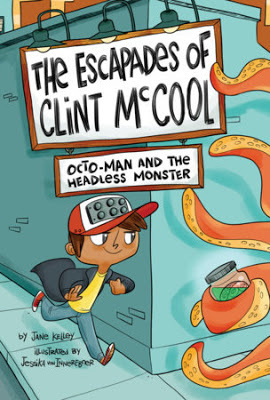 Fabulous cover by Jessika von InnerebnerI first wrote about Clint McCool shortly after my debut MG novel was published. Back then, his antics were too much for me. Just like the fictional grown-ups in his life, I had no idea how to control his manic energy. In fact one editor's comment on an early version was that he exhausted her. Zing, zong, zing! Clint McCool had way too many ideas––and so did I.
Fabulous cover by Jessika von InnerebnerI first wrote about Clint McCool shortly after my debut MG novel was published. Back then, his antics were too much for me. Just like the fictional grown-ups in his life, I had no idea how to control his manic energy. In fact one editor's comment on an early version was that he exhausted her. Zing, zong, zing! Clint McCool had way too many ideas––and so did I.
Luckily a wise editor Bonnie Bader suggested that maybe 300 pages of brain flashes were a little much. She asked me to turn the middle-grade novel into a chapter book. With those limits, Clint McCool was saved. When the publisher wanted a second book, I had plenty of escapades from that longer version ready to go. In Sol Ray Man and the Freaky Flood, I even got to use another of my favorite characters--Clint McCool's former babysitter.
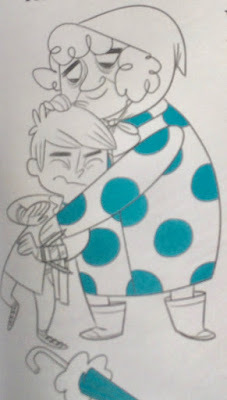 Illustration by Jessika von Innerebner
Illustration by Jessika von Innerebner
Clint McCool and Mrs. Brussels were lucky. I doubt that poor Meredith will be. I don't dwell on the books that might have been. And yet many of my personal disappointments have provided subtexts for my novels. Nursing those losses has forced me to think deeply about them. That made them excellent grist for my mill.
You never know when a character from a failure will spring into action and, like Clint McCool, save the day.
In fact, my current work in progress relies upon that.
Eventually, I hope, it will be my new favorite failure.
Failures are just as difficult––maybe because there are more of them. I've filled dozens of journals over the years. A few of those pages have made it into print. Most haven't. A character named Meredith actually appeared in three different works-in-progress, all of which are still buried in the scrap heap.
One persistent little fellow managed to rise from the dead. His name had changed from his early life, but his outrageous behavior was the same. So was his desire to be a super hero and save the day. And now his book sits on my shelf.
 Fabulous cover by Jessika von InnerebnerI first wrote about Clint McCool shortly after my debut MG novel was published. Back then, his antics were too much for me. Just like the fictional grown-ups in his life, I had no idea how to control his manic energy. In fact one editor's comment on an early version was that he exhausted her. Zing, zong, zing! Clint McCool had way too many ideas––and so did I.
Fabulous cover by Jessika von InnerebnerI first wrote about Clint McCool shortly after my debut MG novel was published. Back then, his antics were too much for me. Just like the fictional grown-ups in his life, I had no idea how to control his manic energy. In fact one editor's comment on an early version was that he exhausted her. Zing, zong, zing! Clint McCool had way too many ideas––and so did I.Luckily a wise editor Bonnie Bader suggested that maybe 300 pages of brain flashes were a little much. She asked me to turn the middle-grade novel into a chapter book. With those limits, Clint McCool was saved. When the publisher wanted a second book, I had plenty of escapades from that longer version ready to go. In Sol Ray Man and the Freaky Flood, I even got to use another of my favorite characters--Clint McCool's former babysitter.
 Illustration by Jessika von Innerebner
Illustration by Jessika von InnerebnerClint McCool and Mrs. Brussels were lucky. I doubt that poor Meredith will be. I don't dwell on the books that might have been. And yet many of my personal disappointments have provided subtexts for my novels. Nursing those losses has forced me to think deeply about them. That made them excellent grist for my mill.
You never know when a character from a failure will spring into action and, like Clint McCool, save the day.
In fact, my current work in progress relies upon that.
Eventually, I hope, it will be my new favorite failure.
Published on December 08, 2019 07:00
December 3, 2019
Redefining Failure
 my first book in the
my first book in thechildren's market,
released Jan. 2010As I reflect on the past decade -- which is also my first decade in the publishing industry, as my first middle grade novel LEAVING GEE'S BEND was released January, 2010 -- I find that one of the most important things I've learned or am learning is how to redefine failure.
Like many of us creative types, I am super-sensitive to the world, and especially to failure. I don't like to fail. I don't like rejection. It can make me want to curl up in a hole and disappear.
But. These days I'm aware that a simple shift in thinking can make all the difference. Mistakes are essential to learning. And what good does it do to beat ourselves up over those mistakes? Which is why I am actively working each day to throw out the old language of "What was I thinking?" after making a mistake/experiencing failure, and shifting that to: What was I LEARNING?
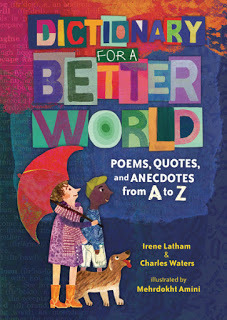 my next (9th) book
my next (9th) bookin the children's market
releasing Feb. 4, 2020Whenever I remember that mistakes and failure are part of the process, and merely stops along the way, I find my heart and mind open again to the muses. I can move forward instead of getting stuck in the muck. I can forgive myself for being an imperfect human. Side benefit: it's also helping me be more forgiving of other people's failures, too. And that is a beautiful thing indeed! Also: this theme shows up in MEET MISS FANCY (my latest book for children) as well as my next one!
------
Irene Latham lives on a lake in rural Alabama. Winner of the 2016 ILA Lee Bennett Hopkins Promising Poet Award, she is the author of hundreds of poems and nearly twenty current and forthcoming poetry, fiction and picture books from publishers including Penguin Random House, Macmillan, Lerner, Boyd Mills/Kane. Her books have been recognized on state lists and honored by NEA, ALA, NCTE, SIBA, Junior Library Guild, Bank Street College and other organizations.
Published on December 03, 2019 03:30
December 2, 2019
A Daily Grind I Don't Want
By Charlotte Bennardo
A number of writers I know journal. I've only been successful at it once. I wrote about the whole tedious, unfair-unless-you're-a-white-male, degrading experience of going through both the criminal (not me, I was the victim), and the civil court system. Writing helped to keep me sane during a process that took 8 years, left me in debt (even though I 'won'), gave me an ulcer, and ultimately, convinced me that our system is really flawed (although I don't know a better alternative). I filled up one of those black and white notebooks we all used in elementary school. Once the trials and farce that is our legal system was over, and my life was my own again, I closed the book, and have never read what I wrote. I never want to read it, so I don't know why I keep it.
For me, journaling was the way I exorcised that time in my life that was just too unbearable to talk about with anyone. I should burn the book because I will never use those experiences in my writing because they are too painful and personal. So yes, I was successful, but no, I never want to do it again.
 Photo courtesy of Negative Space, Pexels.
Photo courtesy of Negative Space, Pexels.
At this point, I want to write all the stories in my head, not jot down my feelings and observations that I will never revisit on the page. Oh, I know I could journal just a sentence, maybe even a single word, but I don't want to invest time in any writing that once written, will be pushed aside and forever ignored. I admire people who can do both. I probably could if I wanted, but I don't want to.
Now...what to do with all those pretty journals I bought or had given to me? I use them for story ideas; this way, I will always have a story idea to write about. So I guess that is journaling in a way, isn't it? I'm journaling my ideas. As I've written previously, I don't always have a notebook with me, so I've written ideas on my arms, on the bottom of my shoes, on napkins. That's journaling, too, right?
I guess I am a successful journaler, but I'm doing it My Way.
Do you journal?
A number of writers I know journal. I've only been successful at it once. I wrote about the whole tedious, unfair-unless-you're-a-white-male, degrading experience of going through both the criminal (not me, I was the victim), and the civil court system. Writing helped to keep me sane during a process that took 8 years, left me in debt (even though I 'won'), gave me an ulcer, and ultimately, convinced me that our system is really flawed (although I don't know a better alternative). I filled up one of those black and white notebooks we all used in elementary school. Once the trials and farce that is our legal system was over, and my life was my own again, I closed the book, and have never read what I wrote. I never want to read it, so I don't know why I keep it.
For me, journaling was the way I exorcised that time in my life that was just too unbearable to talk about with anyone. I should burn the book because I will never use those experiences in my writing because they are too painful and personal. So yes, I was successful, but no, I never want to do it again.
 Photo courtesy of Negative Space, Pexels.
Photo courtesy of Negative Space, Pexels.At this point, I want to write all the stories in my head, not jot down my feelings and observations that I will never revisit on the page. Oh, I know I could journal just a sentence, maybe even a single word, but I don't want to invest time in any writing that once written, will be pushed aside and forever ignored. I admire people who can do both. I probably could if I wanted, but I don't want to.
Now...what to do with all those pretty journals I bought or had given to me? I use them for story ideas; this way, I will always have a story idea to write about. So I guess that is journaling in a way, isn't it? I'm journaling my ideas. As I've written previously, I don't always have a notebook with me, so I've written ideas on my arms, on the bottom of my shoes, on napkins. That's journaling, too, right?
I guess I am a successful journaler, but I'm doing it My Way.
Do you journal?
Published on December 02, 2019 12:56



